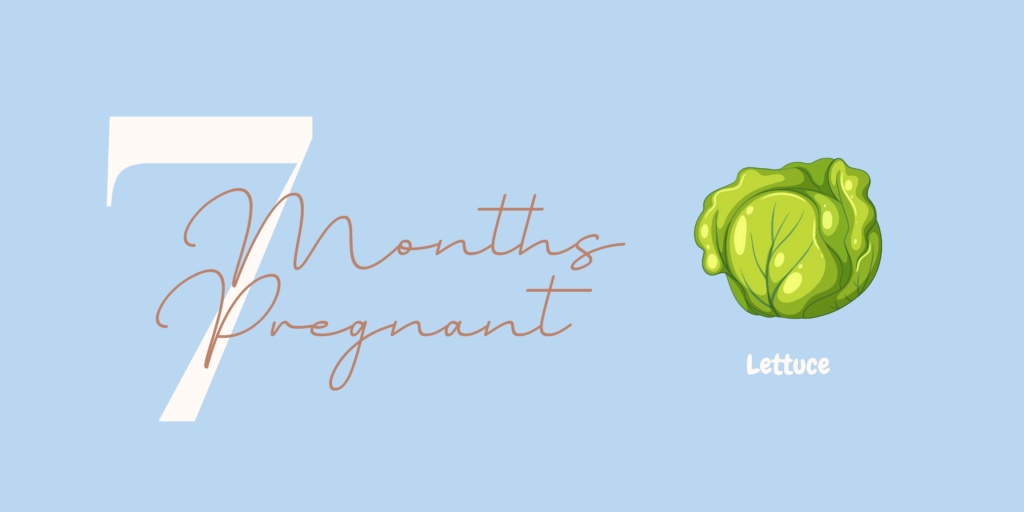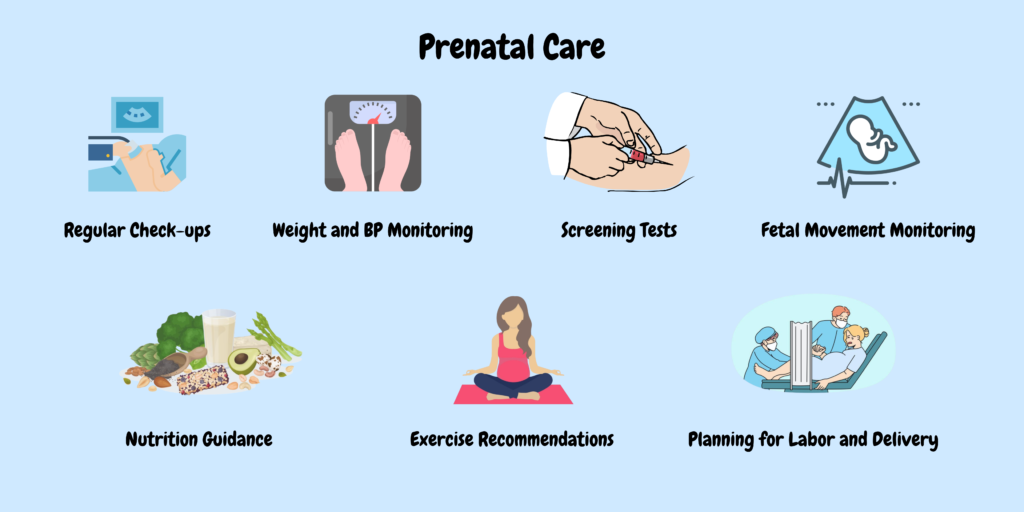7th month of pregnancy (28-31 weeks)

In the seventh month of pregnancy covering (28 to 31 weeks), significant developments occur for both the mother and the growing baby. Now, you are officially in the 3rd trimester and heading towards welcoming your newborn. The baby continues to grow rapidly, gaining weight and accumulating fat, which helps regulate body temperature after birth. At this stage, the baby’s organs are maturing, and movements may become more pronounced as space in the uterus becomes limited. Regular prenatal check-ups are crucial during this time to monitor the health of both mother and baby.
On this page
1. Common Pregnancy symptoms at 7th months pregnant
At seven months pregnant, many women experience a range of common symptoms, including:
- Fatigue: Increased tiredness as the body works harder to support the growing baby.
- Back Pain: Discomfort due to the added weight and changes in posture.
- Swelling: Edema in the feet, ankles, and hands due to fluid retention.
- Shortness of Breath: Pressure on the diaphragm can make it harder to breathe deeply.
- Heartburn and Indigestion: Hormonal changes and pressure from the uterus can lead to digestive issues.
- Frequent Urination: Increased pressure on the bladder as the baby grows.
- Braxton Hicks Contractions: Occasional tightening of the abdomen as the body prepares for labor.
- Stretch Marks: Skin stretching as the belly expands can lead to stretch marks.
- Changes in Skin and Hair: Hormonal changes may result in changes to skin pigmentation or hair texture.
- Leg Cramps: Sudden muscle cramps, particularly at night, due to changes in circulation and increased weight.
- Varicose Veins: Swollen veins in the legs or vulva due to increased blood volume and pressure.
- Increased Vaginal Discharge: A normal increase in discharge as the body prepares for labor.
- Changes in Breasts: Tenderness, swelling, and darkening of the areolas as the body prepares for breastfeeding.
These symptoms can vary from person to person. Always consult with a healthcare provider if any symptoms feel unusual or concerning.
2. Fetal Development

During the seventh month of pregnancy, significant developments occur in the fetus:
- Size and Weight: The baby typically measures around 14 to 16 inches long and weighs about 2 to 4 pounds.
- Brain Development: The brain is developing quickly, forming new neural connections, which enhances cognitive function.
- Lung Maturity: The lungs are maturing, with the production of surfactant, essential for breathing after birth.
- Sensory Development: The baby can now respond to sounds and may react to stimuli, such as light and touch.
- Movement: Fetal movements become more pronounced as the baby practices movements like kicking, rolling, and stretching.
- Facial Features: The baby’s facial features become more defined, and eyelashes and eyebrows may begin to grow.
- Skin Changes: The skin is less translucent as fat layers build up, giving it a smoother appearance.
- Positioning: The baby may start to position itself for birth, often settling into a head-down position.
- Immune System: The baby’s immune system is developing, receiving antibodies from the mother through the placenta.
3. Size and Weight of Baby
At seven months pregnant, the baby is typically the size of lettuce. The baby typically measures around 14 to 16 inches (about 35 to 41 centimeters) in length and weighs approximately 2 to 4 pounds (about 0.9 to 1.8 kilograms). Growth during this month is significant, with the baby continuing to gain weight and accumulate fat, which will help with temperature regulation after birth.
4. Prenatal care at 7th months pregnant

At seven months pregnant, prenatal care is crucial to ensure the health and well-being of both the mother and the developing baby. Key components of prenatal care during this stage include:
- Regular Check-ups: Monthly visits to the healthcare provider to monitor the baby’s growth, fetal heart rate, and the mother’s health.
- Weight and Blood Pressure Monitoring: Tracking weight gain and blood pressure helps identify any potential issues, such as gestational diabetes or preeclampsia.
- Screening Tests: Performing necessary screenings, such as the glucose tolerance test and blood tests to check for anemia or infections.
- Fetal Movement Monitoring: Encouraging mothers to be aware of the baby’s movements and report any significant changes.
- Nutrition Guidance: Providing dietary advice to ensure the mother gets essential nutrients and maintains a healthy weight.
- Exercise Recommendations: Discussing safe physical activity to help with stamina and overall health.
- Planning for Labor and Delivery: Discussing preferences and plans for labor, delivery, and postnatal care.
Maintaining consistent prenatal care during this stage helps catch any potential issues early and supports a healthy pregnancy. Always consult with a healthcare provider for personalized advice and recommendations.
5. Fetal Movements at 7th months pregnant
At seven months pregnant, fetal movement becomes more pronounced and can be felt more frequently. Here are some key points about fetal movement during this stage:
- Increased Activity: The baby is growing and becoming more active, with movements often felt as kicks, rolls, and stretches. These movements can be quite strong.
- Movement Patterns: While the frequency of movements can vary, most babies establish a pattern that may include periods of increased activity and rest.
- Feeling Movement: Mothers may feel movements throughout the day, particularly after eating or when they are lying down.
- Monitoring Movements: It’s important for mothers to track their baby’s movements. A decrease in movement can be a sign of potential issues.
- Kick Counts: Some healthcare providers recommend counting kicks. A common method is to count at least 10 movements within two hours; if this does not occur, it’s important to consult a doctor.
Overall, fetal movement is a positive sign of the baby’s health and well-being. If there are any concerns about movement, it’s always best to reach out to a healthcare provider.
6. Checklist for when you’re at 7th months pregnant
Here’s a helpful checklist for when you’re seven months pregnant to ensure you’re prepared and taking care of yourself and your baby:
- Attend Prenatal Check-ups: Ensure you’re up-to-date with your appointments and any necessary screenings.
- Monitor Fetal Movements: Track your baby’s movements and note any changes.
- Manage Symptoms: Address common pregnancy discomforts, such as back pain, swelling, and heartburn.
- Stay Hydrated: Drink plenty of water to stay hydrated and reduce swelling.
- Eat a Balanced Diet: Focus on nutrient-rich foods to support both your health and the baby’s development.
- Purchase Baby Gear: Acquire necessary items such as diapers, clothing, and feeding supplies.
- Review Birth Plan: Discuss your preferences for labor and delivery with your healthcare provider.
- Learn about Breastfeeding: Educate yourself about breastfeeding and consider attending a breastfeeding class.
- Practice Relaxation Techniques: Explore techniques like deep breathing, meditation, or prenatal yoga to manage stress.
- Connect with Support: Stay connected with friends, family, or support groups for emotional support.
- Check Insurance Coverage: Review your health insurance to understand coverage for delivery and postpartum care.
This checklist can help you stay organized and prepared as you approach the final stages of your pregnancy. Always consult with your healthcare provider for personalized advice and recommendations.

